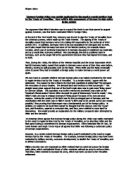An historian Shirer agrees that German foreign policy during the 1930s was mainly motivated by the need to regain territory lost by the Treaty of Versailles, as he describes Hitler and the Nazi party having a commitment to German expansionism. Other historians like EH Carr, Sir Lewis Namier and Hugh Trevor Roper all agreed that Hitler was following a systematic policy of German expansionism.
However, to a certain extent German foreign policy wasn’t motivated by the need to regain territory lost by the Treaty of Versailles. For example, German foreign policy may have been motivated by military security, economic development, to abolish the Treaty of Versailles, and to defeat Communism.
Military security was very important as Hitler realised that he could not pursue his foreign policy aims, which contradicted those of other countries without an army to enforce them. Therefore, Hitler needed to increase his army, which had been cut due to the Versailles settlement.
Also, rearmament was so enthusiastically pursued that foreign observers contemplated that Germany possessed large scale and well equipped resources sooner than was actually the case, leading to fears of Germany when in fact there was no need to. The fact that rearmament was ‘pursued vigorously’ leads me to think that maybe German foreign policy was mainly motivated by the need to rearm, because the other factors in Hitler’s foreign policy may not have been able to happen if it wasn’t for an increased army and weapons which were decreased as part of the Treaty after WWI.
Another factor that could have motivated German foreign policy is economic developed. In 1933 Germany was a depressed economy due to the effect of the Wall Street Crash and subsequent Depression in America at the end of the 1920s. Therefore, the Nazi Party had to promise to recover the German economy in their foreign policy to gain votes to be able to come to power. The reason for this is because unemployment was becoming increasingly high and therefore the German people needed a party to believe in that would turn Germany back to a major power.
In September 1936 Hitler announced the Four-Year Plan to recover Germany and to push rearmament even further.
The main aims of the Four-Year Plan was to make Germany 100 per cent self-sufficient and therefore to make important materials that could be imported from abroad, however, I believe that Hitler was planning to become isolated from foreign affairs. Also, Hitler wanted Germany and her economy to be ready for war in four years. Therefore, it could be argued that Hitler was planning a war even then to get what he wants for his foreign policy.
Another factor, which could have motivated Hitler’s foreign policy, was to defeat communism. The main reason for this is because Hitler believed that the Bolsheviks helped cause the defeat of Germany in World War One, and therefore wished to ruin their regime. Also, Hitler feared that communism would eventually come into Germany and overthrow the Nazi regime. Therefore, this is the reason why Hitler wanted to invade Russia and to stop the threat of Bolshevik takeover, as well as the prospect of gaining more ‘living space.’
The last factor, which could have been motivated by the German foreign policy, was the abolishment of the Treaty of Versailles. The main reason why the German foreign policy could have been motivated by the abolishment of the Treaty of Versailles was that Hitler knew that the abolishment of the Treaty of Versailles would prove popular with the population of Germany because everyone that that the Versailles settlement was unjust and humiliating to them. Therefore, by placing this into their foreign policy Hitler knew that they were guaranteed votes because this is what the German population wanted.
Also, the Versailles settlement meant that they now had tiny armed forces; therefore, Hitler was worried of an invasion by Russia or another power, and was aware that because they had a small army they were not capable of fighting against an unaware attack.
To conclude, I believe that ‘German foreign policy was mainly motivated by the need to regain territory lost by the Treaty of Versailles’ because by gaining more living space especially by force proved that Germany at this time was a Great Power again in Europe and a power not to contend with. Also, I believe that some of the other factors I have mentioned in this essay, for instance, military security and economic developments were used to eventually be able to gain lebensraum. The military would have to be involved with gaining more ‘living space’ because other powers would have fought against the aggressor to protect the country from being invaded, therefore, Germany would had to have a strong and large army to be able to conquer their chosen territory.
However, it is possible that another of Hitler’s aims would have motivated the German foreign policy. For example, Hitler eventually wanted Germany to become self-sufficient and therefore, one of her main aims would have to been to improving the economy in Germany.
Also, it is possible that all of these aims from Hitler’s Foreign Policy are as important as one another. One of Hitler’s aims was to defy and not revise the Treaty of Versailles. All of the things I have mentioned in this essay are connected with the Treaty of Versailles. Therefore, it could be argued that the German foreign policy during the 1930s was mainly motivated by the defiance of the Treaty of Versailles.







